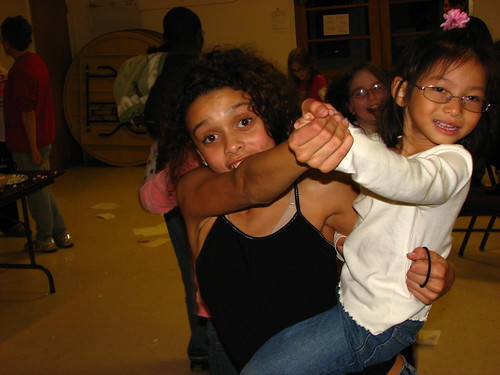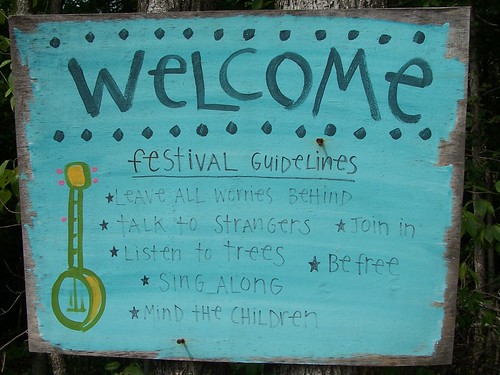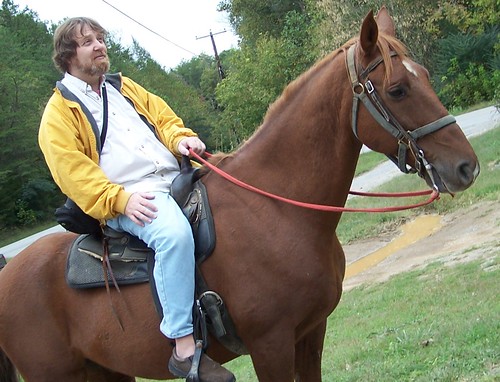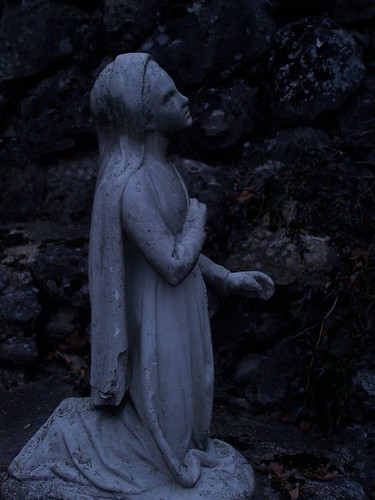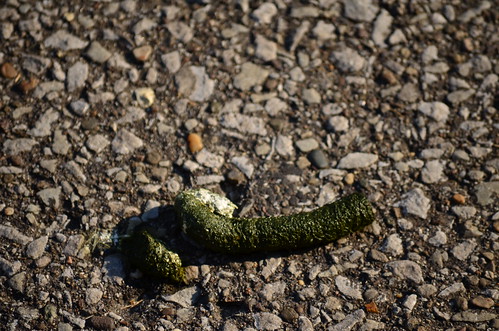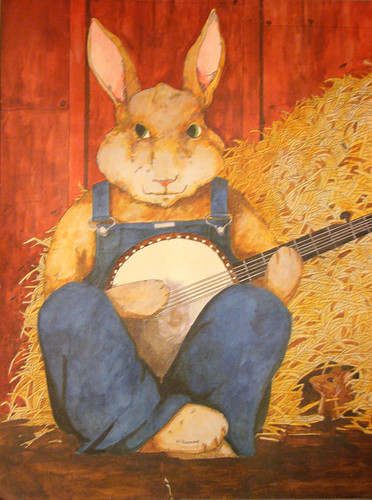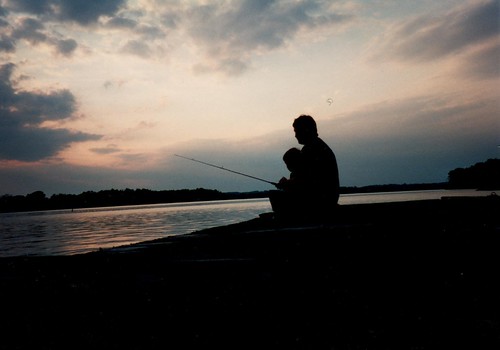Monday, December 31, 2012
Three Things to Remember
Sometimes breaking the rules is just extending the rules.
Sometimes there are no rules.
~Mary Oliver, from her book of poetry, A Thousand Mornings.
Wednesday, December 26, 2012
Tuesday, December 18, 2012
Scary Santa
I've had a busy month, with my dear old father being seriously ill. Nothing outstanding to post today, just a fun photo of my wife Donna as a child with her brother and Santa (or is it SATAN??)
Any prayers and good thoughts sent towards my beloved parents (who will be celebrating their 63rd anniversary next Valentines Day) during this time are appreciated.
Peace and goodwill to all.
Wednesday, December 5, 2012
Wisdom...
Some quotes from the Persian poet, Hafiz...
Fear is the cheapest room in the house.
I would like to see you living
In better conditions...
Sometimes I say to a poem,
"I don't have the strength
To wring out another drop
Of the sun."
And the poem will often
Respond
By climbing onto a barroom table:
Then lifts its skirt, winks,
Causing the whole sky to
Fall...
Don't surrender your loneliness so quickly. Let it cut you more deep. Let it ferment and season you as few humans and even divine ingredients can. Something missing in my heart tonight has made my eyes so soft, my voice so tender, my need for God absolutely clear...
now is the season to know that everything you do is sacred
This
Path to God
Made me such an old sweet beggar.
I was starving until one night
My love tricked God Himself
To fall into my bowl.
Now Hafiz is infintely rich,
But all I ever want to do
Is keep emptying out
My emerald-filled
Pockets
Upon
This tear-stained
World...
The words you speak become the house you live in.
Happy Holiday Season, everyone!
Monday, November 26, 2012
Ordinary Extraordinary Days
In the Church Calendar, the time between Easter and Advent is traditionally called "Ordinary Time." At our church, we often use this time period to bring to mind how we can find God in the Ordinary moments and events of each of our lives. To that end, our dear friend, Kate, wrote a song to celebrate Ordinary Time. She borrowed the chorus from a traditional Arabic hymn sung in Moroccan churches (and perhaps elsewhere).
The translation of the chorus is...
You are magnificent, magnificent, magnificent, O God.
Magnificent in your loving,
in your faithfulness,
in your liberating,
also in your healing, also in your healing
Kate and friends played/sang the song yesterday, accompanied by this slide show, showing moments from our every day lives here in the US, in Morocco, in Mexico and Guatemala. The photos came from our friends here and in these various places around the world.
As Ordinary Time draws to a close and we begin the Advent season, may we always have eyes to see God in the Ordinary.
Tuesday, November 20, 2012
Moon Dancers
Whether it is to our liking or not, we will find ourselves in darkness a full half of our lives. For some of us, maybe more.
[And let me be vague here: I'm speaking primarily of that chasm that separates a physical day and a physical night - although if you can find some metaphorical reasoning here worth considering, then consider, away.]
We can - and many do - choose to curse that entire blackened half of our lives. We can choose to spit on it, despise it, fear it, despair of it, dread its daily return... but I have to think that it makes some certain amount of sense to embrace that solemn darkness and find what strength and hope it may offer, for its own sake.
Can't we find a peace that can come only in the darkness, the grace of rest undisturbed by bright, relentless, piercing light?
Can't we find adventure that can only be found in the black night - the joy of carefully walking a path not by sight, but by touch and sound, smell and taste... stepping slowly down a night-covered path, feeling cautiously (and with a certain nervous excitement) with our feet for roots that might trip us, searching for a breeze on our cheeks, listening for a rustle of leaves and maybe just the hint of light from a cloud-covered moon and pin-pricked stars to give us a clue as to which way to go?
Can't we find comfort, even in the cold and unwanted darkness, despite its inconvenience, despite its gloom?
I don't know, I don't know. I do know it's easier to say "embrace the darkness," while I sit clothed in lightness.
But maybe the very challenge of embracing the dark and accepting the limitations imposed upon us by that Shroud which Obscures... maybe that challenge is something not only to be painfully endured until it has passed, but to be loved for its own sake?
I don't know. I just don't think I want to wish away half my life.
Says the fella thinking in the light of day.
Thursday, November 15, 2012
Autumn Leaves
That old September feeling, left over from school days, of summer passing, vacation nearly done, obligations gathering, books and football in the air ...
Another fall, another turned page: there was something of jubilee in that annual autumnal beginning, as if last year's mistakes had been wiped clean by summer.
~Wallace Stegner
New Beginnings
There are as many worlds as there are kinds of days, and as an opal changes its colors and its fire to match the nature of a day, so do I.
~John Steinbeck
Tuesday, November 13, 2012
What's That Sound?
Do you hear it...?
....
That's the sound of VERY few (by recent historical standards) scandals happening within the Obama administration and, actually, even within the extended gov't (House and Senate) in general over the last four years.
It sort of reminds me of the day after 9/11 when you'd be outside and suddenly notice that something was significantly different and... missing, and you'd pause a second and realize... it's the ABSENCE of airplanes - the silence was jolting!
It feels sort of like that with Obama era scandals. Wow. We've had very few scandals the last four years! What's up with that?
Yes, there have been some. The "Fast and Furious" kerfluffle. This Petraeus thing, however it shakes out. Um... allegations of ineptitude in handling the Libya attack? The Secret Service/Colombia prostitute issue? Solyndra?
This website lists 400 scandals during George W Bush's eight years. But that particular site defines scandal pretty loosely. Included in that list is the "scandal" that Bush spent 35% of his time in office on vacation. I suppose that is scandalous in many ways, but it's not really what I'm thinking of as a "scandal."
Here is a more generous list that limits items to actions that, they say, "were the subjects of criminal probes, but we also included officials who were credibly accused of acts that, if not criminal, were a corruption of office..."
At this site, we find ten Bush appointees/administration flaks who were convicted of crimes in office.
We find 24 people who resigned due to "investigation, pending investigation or (credible) allegations of impropriety.
And we find three who were under investigation, but who stayed in office (as of 2008).
As compared to Obama's handful of missteps.
This site is, to me, way too generous. Bush began his administration, for instance, by hiring two Reagan-era political hacks who had been CONVICTED of lying to Congress about actual support for war crimes during the Nicaragua fight. Also, the whole invasion of Iraq based on false data is a HUGE scandal that does not appear on this list...
So, a list of between 37 and 400 serious scandals over Bush's eight years.
Whereas, the Obama administration has... what, four? five?
And in each of those, the problems were not anything to do directly with Obama and were mostly ineptitude, at best (if we include the Solyndra problem on the list to get it up to a complete hand-full of five, then we'd have to include a WHOLE lot more on Bush's list, that sort of "scandal" - ie, potentially poor judgment calls in spending gov't money on programs, happens frequently. It's not really what I would call a scandal, any more than Bush's vacation days are a real scandal...)
All in all, I'd have to say congratulations to the Obama administration, and I guess, even our current Congress, for at least keeping their collective noses clean, as compared to recent administrations/eras (Reagan/Bush/Bush AND Clinton).
=======
Just for two other comparisons...
Wikipedia lists convictions of federal office holders during each administration's term...
Obama: 1 (1 judge)
W Bush: 9 (6 GOP representatives, 3 Dem representatives)
Clinton: 13 (1 Executive branch, 9 Dem reps, 3 GOP reps)
HW Bush: 5 (1 Executive branch, 2 Dem reps, 1 GOP rep and 1 judge)
And, get ready for it...
Reagan: 24 (Executive branch: 7; Legislative: 5 GOP, 10 Dem; Judges: 2)
Carter: 6 Dem reps
And, with the Reagan years, some of those convictions and scandals were about actual war crimes - selling weapons to thugs to send money to terrorists!, etc - not merely cheating on your wife and lying about it, just for a sense of scale (not to downplay how horrible it is to cheat on a spouse or lie, by the way... just noting that war crimes are a whole other level of scandal...)
Here's another wikipedia list of scandals (as opposed to convictions, above). This list, to me, seems to capture the notion of "serious scandal" best...
Obama: Executive: 3; Legislative: 3 (1 Dem, 2 GOP); Judicial: 2
W Bush: Executive: ~42; Legislative: 26 (7 Dem, 19 GOP)
Clinton: Executive: ~10; Legislative: 16 (10 Dem, 4 GOP, 2 "other")
HW Bush had not too many. The Reagan years had many, many. Feel free to read them yourselves.
Monday, November 12, 2012
Autumn Path
holy, pale
miracle trail
scattered glory
of an old, old Story
like a fox
trading secrets
with a silk-suited crow
Friday, November 2, 2012
What Does Jesus Say...?
"What is Jesus' teaching about war? Chapter and verse."
I would like to respond here (with the acknowledgment that I've done this before), to allow room to reflect upon this sometimes contentious, sometimes difficult question.
1. Jesus had NO STATED position on war. That is, Jesus never once is quoted as saying "I'm for war." "I'm against war." "I think war is hell." or "I think war is cute and cuddly." It never happens in the Bible where Jesus specifically addresses war.
2. On the other hand, Jesus has a good deal to say about how we deal with the "enemy" and with living lives of peace in general. Consider these from Jesus and his disciples...
A. Blessed are the peacemakers, for they will be called children of God.
B. But to you who are listening I say: Love your enemies, do good to those who hate you, bless those who curse you, pray for those who mistreat you.
If someone slaps you on one cheek, turn to them the other also. If someone takes your coat, do not withhold your shirt from them. Give to everyone who asks you, and if anyone takes what belongs to you, do not demand it back.
Do to others as you would have them do to you.
“If you love those who love you, what credit is that to you? Even sinners love those who love them. And if you do good to those who are good to you, what credit is that to you? Even sinners do that. And if you lend to those from whom you expect repayment, what credit is that to you? Even sinners lend to sinners, expecting to be repaid in full.
But love your enemies, do good to them, and lend to them without expecting to get anything back. Then your reward will be great, and you will be children of the Most High, because he is kind to the ungrateful and wicked. Be merciful, just as your Father is merciful.
C. Then Simon Peter, who had a sword, drew it and struck the high priest’s servant, cutting off his right ear.
Jesus commanded Peter, “Put your sword away! Shall I not drink the cup the Father has given me?”
...“My kingdom is not of this world. If it were, my servants would fight to prevent my arrest by the Jewish leaders. But now my kingdom is from another place.”
D. If someone has done you wrong, do not repay him with a wrong. Try to do what everyone considers to be good.
Do everything possible on your part to live in peace with everybody.
Never take revenge, instead let God’s anger do it.
If your enemies are hungry, feed them. Do not let evil defeat you; instead, conquer evil with good.”
"Let the peace of Christ rule in your hearts."
E. Bless those who persecute you; bless and do not curse. Rejoice with those who rejoice; mourn with those who mourn.
Live in harmony with one another. Do not be proud, but be willing to associate with people of low position. Do not be conceited.
Do not repay anyone evil for evil. Be careful to do what is right in the eyes of everyone.
If it is possible, as far as it depends on you, live at peace with everyone.
Do not take revenge, my dear friends, but leave room for God’s wrath, for it is written: “It is mine to avenge; I will repay,” says the Lord. On the contrary:
“If your enemy is hungry, feed him;
if he is thirsty, give him something to drink.
In doing this, you will heap burning coals on his head.”
Do not be overcome by evil, but overcome evil with good.
F. Do not repay evil with evil or insult with insult. On the contrary, repay evil with blessing, because to this you were called so that you may inherit a blessing. For,
“Whoever would love life
and see good days
must keep their tongue from evil
and their lips from deceitful speech.
They must turn from evil and do good;
they must seek peace and pursue it.
For the eyes of the Lord are on the righteous
and his ears are attentive to their prayer,
but the face of the Lord is against those who do evil.”
G. Who is going to harm you if you are eager to do good? But even if you should suffer for what is right, you are blessed. “Do not fear their threats; do not be frightened.”
But in your hearts revere Christ as Lord. Always be prepared to give an answer to everyone who asks you to give the reason for the hope that you have. But do this with gentleness and respect, keeping a clear conscience, so that those who speak maliciously against your good behavior in Christ may be ashamed of their slander.
For it is better, if it is God’s will, to suffer for doing good than for doing evil. For Christ also suffered once for sins, the righteous for the unrighteous, to bring you to God.
H. But how is it to your credit if you receive a beating for doing wrong and endure it? But if you suffer for doing good and you endure it, this is commendable before God.
To this you were called, because Christ suffered for you, leaving you an example, that you should follow in his steps.
“He committed no sin,
and no deceit was found in his mouth.”
When they hurled their insults at him, he did not retaliate; when he suffered, he made no threats. Instead, he entrusted himself to him who judges justly.
3. So, while Jesus CLEARLY had no stated position about War, he had a great deal to say about love for neighbors, love for enemies, how to treat enemies, how to live peaceable lives, etc. Notably, there is not ANYTHING in Jesus' teachings that suggests, "Sometimes, it's okay to kill your enemies. Sometimes, it's okay for Christians to go to war." It's not there, anywhere.
While there are multiple "peace-making" commands and teachings, there are zero encouraging us to go to war, especially a modern-type war where shedding of innocent blood (consistently condemned biblically) is a given.
4. When asked something like this by those on the Religious Right, I always ask in return, "Given what Truths Jesus and his followers taught us, the guidelines for living in the Christian Way, what verses/teachings would you offer to suggest, sometimes it IS okay to go to war? and even sometimes shed innocent blood...?" I rarely get an answer.
5. You really have to go to the Old Testament to find even a hint of a suggestion that war is okay. But even there, what you have are the same overall Truths/Teachings to be peaceable ("Love your enemies," "Shed no innocent blood," cries out against the sorts of oppressions and killings found in wartime) and beyond these general truths/teachings, you find some EXCEPTIONS to those teachings where God specifically says, "Israel, go to war and wipe out this other evil nation, including the men, women and children..."
But these are obviously EXCEPTIONS to the rules (even if you take these stories literally, which I would question the wisdom of) where God makes a specific-to-Israel exception. Normally - hopefully we can all agree - it is wrong to slaughter men, women and children, even of an enemy. God made an exception in these stories. But the constant, overarching guide/rule/truth/teaching remains: Love your enemies. Shed no innocent blood. Period. NEVER do we find a command, "Sometimes, when dealing with an enemy, I want you to go to war." It simply is not in the Bible.
6. So, GIVEN THAT, where would any Bible believers find a biblical place that supports war-for-Christians?
7. The one New Testament passage that most often gets quoted is Romans 13, the passage that says government should punish wrong-doers...
Let everyone be subject to the governing authorities, for there is no authority except that which God has established. The authorities that exist have been established by God. Consequently, whoever rebels against the authority is rebelling against what God has instituted, and those who do so will bring judgment on themselves.
For rulers hold no terror for those who do right, but for those who do wrong. Do you want to be free from fear of the one in authority? Then do what is right and you will be commended. For the one in authority is God’s servant for your good. But if you do wrong, be afraid, for rulers do not bear the sword for no reason. They are God’s servants, agents of wrath to bring punishment on the wrongdoer.
8. This passage is not a defense of Christians going to war. It just isn't. It isn't even specifically about war, although one could make the case that it might include gov't's waging war, possibly.
9. This passage, though, more closely sounds like a defense of a government having a police department to deal with "whoever rebels against the authority" of government.
10. This passage also sounds quite time- and place-specific. I don't think anyone would argue that a government that chose to punish a group or individuals for no reasons (ie, they had done nothing reasonably wrong) is acting on God's behalf, for instance.
11. Still, at best, this passage is an argument saying that Governments have the responsibility to (some would say) go to physically punish wrong-doers. But saying that the government has a responsibilty to punish rebels is NOT the same as saying Christians can biblically go to war.
12. No, the idea that Christians can choose to go to war is a very difficult argument to make if one is only using the Bible. And, indeed, most of the time, the argument I hear - even from the Religious Right - is one borne out of fear, not out of the Biblical witness...
Arguments along the lines of, "If we don't go to war, then bad things will happen... 'the enemy' will try to harm us or kill us or otherwise misbehave... therefore, sometimes we have to go to war." That is a pragmatic argument and one that could be debated, but it's not a biblical argument.
13. So, looking at the totality of what the Bible does and doesn't say about Christians engaging in War or Christian peacemaking efforts, I'd say the totality of biblical witness comes down heavily on the peacemaking side and only by stretching and reaching outside of the Bible can one create an argument for Christians being war-makers.
Thanks for asking.
Thursday, November 1, 2012
"Big" Government: A Breath of Fresh Air...
Did you know that, in Kentucky, the concentration of acid-rain-causing sulfur dioxide in the ambient air has been reduced 81 percent since 1981? How about the fact that smog-forming nitrogen oxides are down 52 percent in the same time period?
Kentucky’s air quality has improved significantly in the 40 years since the Clean Air Act was passed. Making this downward trend in pollution levels all the more remarkable, Kentucky has seen continued economic development and population growth over the course of these past four decades.
Our improved air quality is a significant achievement considering that economic and population growth results in additional pollution sources from expanded industry, more traffic, and greater energy demand in a state that obtains roughly 96 percent of its electricity from coal. Yet as the economy has more than tripled, air quality has continued to improve – proof that environmental protection and economic development can go hand in hand...
You can read the whole story here.
The whole question of whether or not we need/want a "big" or "small" government is not the main issue to me. I want a SMART government. If a government has a bunch of rules intended to make things better and improve the commonwealth but the rules - however well-meaning - do not accomplish those goals, that is not smart government.
If we do away with rules in response to the problems associated with the rules - and the initial problem gets worse! - that is not smart government, either.
Well-written rules that help the common wealth while allowing for maximum freedom (and yet protecting liberties from those who'd abuse their "freedom"), this is what I want to see in my government.
I like the Clean Water and Clean Air rules and regulations we put in place primarily because they are effective at helping us all enjoy maximum liberties while ensuring that we do so responsibly. A state with many, many jobs where people are making plenty of money, BUT where the air and water is so polluted that lives are cut short and no one gets to enjoy the benefits of their jobs, that is not a goal I want to see lived out.
FEMA and having an adequate government response to disasters like Sandy is another example of smart government (as long as it's done well). Private, scattered support and charity has its place, but it would not easily be as concentrated and coordinated and guaranteed as a governmental response. When the GOP starts talking about making government smaller, there's always the risk of removing essential, wise programs.
Jobs? Sure. But jobs created within a smart and responsible context, in ways that don't cause harm/interrupt liberties of the masses.
That should be our goal.
As this article demonstrates in Kentucky, we can have both and should demand both.
And, as Wendell Berry has often pointed out: We must need keep in mind that the economy (and our jobs) are a subset of the environment, and not the other way around. So we need to keep that in mind as we prioritize. A sick environment can not long sustain a healthy economy or a healthy society.
Monday, October 29, 2012
Wednesday, October 24, 2012
Beady - When I'm Twenty
The first official-ish music video from Beady, my kids' band...
Their album, "Youngest Days" is due to be out on December 11th. You can find more information at their website, beadyband.com
Another Young Hero
So, this post is NOT about her latest hateful comments (which I won't even repeat here, but you'll be able to tell from the text below), but rather, one great young man's response to her words. We need more John Franklins in this world, who has more brains, nobility, grace and courage in his pinky than folk like She Who Must Not Be Mentioned in their whole person...
Come on Ms. Coulter, you aren’t dumb and you aren’t shallow. So why are you continually using a word like the R-word as an insult?
I’m a 30 year old man with Down syndrome who has struggled with the public’s perception that an intellectual disability means that I am dumb and shallow. I am not either of those things, but I do process information more slowly than the rest of you. In fact it has taken me all day to figure out how to respond to your use of the R-word last night.
I thought first of asking whether you meant to describe the President as someone who was bullied as a child by people like you, but rose above it to find a way to succeed in life as many of my fellow Special Olympians have.
Then I wondered if you meant to describe him as someone who has to struggle to be thoughtful about everything he says, as everyone else races from one snarkey sound bite to the next.
Finally, I wondered if you meant to degrade him as someone who is likely to receive bad health care, live in low grade housing with very little income and still manages to see life as a wonderful gift.
Because, Ms. Coulter, that is who we are – and much, much more.
After I saw your tweet, I realized you just wanted to belittle the President by linking him to people like me. You assumed that people would understand and accept that being linked to someone like me is an insult and you assumed you could get away with it and still appear on TV.
I have to wonder if you considered other hateful words but recoiled from the backlash.
Well, Ms. Coulter, you, and society, need to learn that being compared to people like me should be considered a badge of honor.
No one overcomes more than we do and still loves life so much.
Come join us someday at Special Olympics. See if you can walk away with your heart unchanged.
A friend you haven’t made yet,
John Franklin Stephens
Global Messenger
Special Olympics Virginia
Thursday, October 18, 2012
Happy Moby Day
For instance, while everyone knows the famous first line of "Moby Dick..."
Call me Ishmael.
Do you recall the second? For, as soon as you get to the second line, you get an immediate sense of the poetry with which the book will be filled...
Some years ago--never mind how long precisely--having little or no money in my purse, and nothing particular to interest me on shore, I thought I would sail about a little and see the watery part of the world.
And on it goes...
Whenever I find myself growing grim about the mouth; whenever it is a damp, drizzly November in my soul; whenever I find myself involuntarily pausing before coffin warehouses, and bringing up the rear of every funeral I meet; and especially whenever my hypos get such an upper hand of me, that it requires a strong moral principle to prevent me from deliberately stepping into the street, and methodically knocking people's hats off - then, I account it high time to get to sea as soon as I can...
...There is a wisdom that is woe; but there is a woe that is madness. And there is a Catskill eagle in some souls that can alike dive down into the blackest gorges, and soar out of them again and become invisible in the sunny spaces. And even if he for ever flies within the gorge, that gorge is in the mountains; so that even in his lowest swoop the mountain eagle is still higher than other birds upon the plain, even though they soar...
Now, three to three, ye stand. Commend the murderous chalices! Bestow them, ye who are now made parties to this indissoluble league.... Drink, ye harpooneers! drink and swear, ye men that man the deathful whaleboat's bow -- Death to Moby Dick! God hunt us all, if we do not hunt Moby Dick to his death...
It was a clear steel-blue day. The firmaments of air and sea were hardly separable in that all-pervading azure; only, the pensive air was transparently pure and soft, with a woman's look, and the robust and man-like sea heaved with long, strong, lingering swells, as Samson's chest in his sleep...
My favorite part of this great book is probably the sometimes comical, sometimes nearly romantic relationship between Ishmael and that terrible cannible pagan whaler, Queequeg...
...and Heaven have mercy on us all - Presbyterians and Pagans alike - for we are all somehow dreadfully cracked about the head, and sadly need mending...
Better to sleep with a sober cannibal than a drunken Christian...
In one word, Queequeg, said I, rather digressively; hell is an idea first born on an undigested apple-dumpling; and since then perpetuated through the hereditary dyspepsias nurtured by Ramadans...
And, of course, we can't forget Ahab's final soliloquy to the Whale...
Towards thee I roll, thou all-destroying but unconquering whale; to the last I grapple with thee;
From
hell’s
heart
I stab at thee;
For hate’s sake I spit my last breath at thee. Sink all coffins and all hearses to one common pool! and since neither can be mine, let me then tow to pieces, while still chasing thee, though tied to thee, thou damned whale! Thus, I give up the spear!
Man! What lively, deadly language!
Have ye a favorite quote from Moby Dick?
Monday, October 15, 2012
My Newest Hero
In her own words, from her blog, entitled, Gul Makai (which means "Corn Flower...")
I have come to Bunair to spend Muharram (a Muslim holiday) on vacation. I adore Bunair because of its mountains and lush green fields. My Swat is also very beautiful but there is no peace. But in Bunair there is peace and tranquility. Neither is there any firing nor any fear. We all are very happy.
Perhaps this craven attack upon a defenseless girl will serve as a catalyst for the sort of change that brave young Malala has worked so hard for. I pray for her recovery, for her family, for her nation. I also pray for those who've so bought into the myth of redemptive violence that they'd even use violence against children in an effort to bully their opponents into submission.
Shame on them. God have mercy on them. May they get the justice they deserve and may Mahala and her family get the peace they deserve.
This 14 year old has more courage in her tiny finger than the thugs who assaulted her, hiding behind their weapons of mass destruction.
As they say, in the end, you inherit the world you create (or is that, "in the end, the love you take is equal to the love you make..."?). Those who live by fear and violence inherit a fearful, violent hell. Those who live by grace and peace, inherit that world. Let it be so.
Tuesday, October 9, 2012
Poet: Madison Cawein
Ghost Story
When the hoot of the owl comes over the hill,
At twelve o'clock when the night is still,
And pale on the pools, where the creek-frogs croon,
Glimmering gray is the light o' the moon;
And under the willows, where waters lie,
The torch of the firefly wanders by;
They say that the miller walks here, walks here,
All covered with chaff, with his crooked staff,
And his horrible hobble and hideous laugh;
The old lame miller hung many a year:
When the hoot of the owl comes over the hill,
He walks alone by the rotting mill.
When the bark of the fox comes over the hill,
At twelve o'clock when the night is shrill,
And faint, on the ways where the crickets creep,
The starlight fails and the shadows sleep;
And under the willows, that toss and moan,
The glow-worm kindles its lanthorn lone;
They say that a woman floats dead, floats dead,
In a weedy space that the lilies lace,
A curse in her eyes and a smile on her face,
The miller's young wife with a gash in her head:
When the bark of the fox comes over the hill,
She floats alone by the rotting mill.
When the howl of the hound comes over the hill,
At twelve o'clock when the night is ill,
And the thunder mutters and forests sob,
And the fox-fire glows like the lamp of a Lob;
And under the willows, that gloom and glance,
The will-o'-the-wisps hold a devils' dance;
They say that that crime is re-acted again,
And each cranny and chink of the mill doth wink
With the light o' hell or the lightning's blink,
And a woman's shrieks come wild through the rain:
When the howl of the hound comes over the hill,
That murder returns to the rotting mill.
Friday, October 5, 2012
RULES
Call people by their given names, not pet names, not demeaning names, just their given names or, if you prefer, an honorific title: Brother, sister, sir, ma'am, friend...
If someone's name is Daniel, then call them Daniel. Not "Danny," not "Dan-dan," not "Dopey Dan..." Just "Daniel."
I insist. Thanks.
Now feel free to politely talk to strangers, to listen, to sing along and to mind the children...
Right-Sized Gov't... Specifics
The fella who misogynistically and with hints of racism drunkenly states, "Danged welfare queens ought to be cut off the gov't teat..." when confronted of the reality of the single mother who has a child with cancer and is needing some assistance and the gov't provides it, that same fella might be willing to allow, "Well, I don't want to cut EVERYONE off, only those who abuse the system... Certainly not that poor mother..."
So, we all agree that we don't want an anarchist state, free of all gov't. We all agree that we don't want a heavy-handed dictatorial state. It's drawing the lines in between the two where we disagree. So, what if I offer a few fairly specific situations where I think obviously we need gov't intervention/regulation, other areas where I allow that it's questionable and yet other areas where gov't intervention/regulation is overkill? And what if you do the same?
OBVIOUS
1. Driving a motor vehicle while impaired - this is an obvious threat to innocent bystanders and can clearly be regulated.
2. Dumping toxic waste into a stream - again, the clear threat of reasonable harm to others.
3. Prohibiting an adult from marrying a five year old. Yuck.
Less Clear
1. Driving while impaired is clearly wrong. But where is the line drawn for "impaired..."? We use Blood Alcohol Content as a measure, often saying .08 BAC is "impaired."
This is, in some sense, an arbitrary line. Is everyone always impaired at .08? I don't know, but I hear that this is not the case. Some states may have higher standards (I believe that Colorado has a .05 standard), is that fair?
What about if someone wanted to make it .0001 BAC? Fair?
Probably not, but the point would be that the gov't can reasonably impose a regulation on a behavior that might cause harm to others and a line has to be drawn somewhere.
2. Obviously, we don't want people dumping toxic/poisonous/hazardous waste into our common waterways. Thus, we've created laws that prohibit, for instance, an individual or company from dumping waste auto oil into a storm drain. That drain leads to our waterways and just don't be stupid.
We WANT our gov't to regulate that behavior and stop by weight of law any who engage in such behavior. But where is that line?
If a company has waste fluids involved in their factory's processes and they clean it up before discharging it to the sewage system, is that good enough? How "clean" does it need to be? If mercury can cause harm to humans when found in water at .0001 parts per million (just made up the number), is it okay to say that company must clean it up to .0001 ppm? Or do we want to say .00001 ppm to be safe?
Where to draw the line can be vague and hard to say, but clearly drawing a line must happen and is a reasonable responsibility of the gov't.
I will say that I lean towards a more conservative take - that is, if it LOOKS LIKE, by our best current knowledge - that pollution at .0001 ppm is possibly dangerous, then we want to disallow pollution at a vastly safer/higher rate...
That is the good type of conservatism, seems to me.
3. Prohibiting three rational adults from marrying... If there is no harm, if everyone is in agreement and wanting this, if no coercion is involved... is it the state's responsibility to say yes or no?
On this topic, I would say that it's less clear as to whether the state ought to be involved or not. My inclination, though, is that polygamy has a history of being predominantly used in cultures that oppress/suppress women. It's almost always one man/many women and not the other way around. The women often have appeared (at least to me) to be overly meek and submissive and perhaps not in the best reasoning place to make the decision due to a harshly patriarchal culture that has encouraged (often by weight of "God will punish you if not" sorts of teachings) this submissiveness. For this reason, I lean against supporting polygamy and think the state has a reason to draw the line.
But I will allow that it's less clear and that an argument could be made that it's not the gov't's business, as long as no one is harmed and everyone is free to make their own rational adult choice.
TOO Much Gov't
1. Gov't saying that an adult can't purchase a twinkie to have as an unhealthy snack of their choice. The only harm there is potentially to the individual and then, only if taken in excess. Same for alcohol, tobacco or marijuana.
2. On the pollution front, I'm not sure where I'd say too much regulation is too much, but I'm sure there's a line I could agree to that's too much. I just think that society's right to clean air and water overrides an individual's or corporation's "right" (which doesn't exist, seems to me) to pollute, even at incredibly small rates.
3. Two adult men or women (gay or straight) wanting to get married. Clearly, the gov't has no business in dictating this, as long as everyone is a rational adult making a decision free of coercion.
=======
So, what about it? Can you offer instances of more specific regulations that you think are justified? That are too much? Some that you're not sure on?
How about this: I hate loud noises. When ambulances, overly-loud car stereos or motorcycles designed to roar pass by, I cover my ears. It causes physical pain (not great pain - I don't want to overstate the point - but extreme annoyance and a bit of pain).
Can the state reasonably regulate this? At certain times of the day, at least? Or in certain locations? I tend to say, Yes (well, except for the ambulance, which is loud for a safety reason).
You?
"I was completely wrong..."
~Mitt Romney
There. That's all he had to do. Clarify an obvious mistake. No harm. No foul. Stupid mistake, that's all.
Move on.
Monday, September 24, 2012
Trust Me...
Paul Waldman at Prospect.org is asking the question that I've been wanting to see asked. Waldman reviews Romney's economic proposals and concludes...
To review: The way Mitt Romney's economic plan differs from what George W. Bush did is that Romney favors exploiting energy resources, free trade, having a good education system, balancing the budget (something every candidate in both parties says they'll do, but only Bill Clinton actually did), tax cuts, and less regulation. In short, Romney's program is exactly the same as what George W. Bush did. Yet Romney says, "My policies are very different than anything you've seen in the past." Right.
Nobody is disputing that the economy could be better, unemployment could be lower and that would be a wonderful thing.
We're all agreed on that much.
The question, then, is - since the GOP and Ryan/Romney are saying "Vote for us and we'll make it better..." - HOW exactly are you going to do this? What are you going to do differently than Obama and, more importantly, different than W Bush did before Obama?
The GOP inherited a healthy economy after Clinton's eight years, they had a chance to "improve" the economy with Republican policies and, at the end of eight years, the economy was in the crapper (not to mention that we were spending trillions of dollars on two questionable wars).
Mr Ryan/Romney: What are you going to do DIFFERENTLY than Bush did and why should we accept the rather overly-simplistic suggestion: Things aren't perfect, so let's change paths...?
The thing about changing paths is that, rather than making an improvement, things could get worse again. What are you proposing that would inspire us to trust you?
Anyone?
Friday, September 21, 2012
Best Dog Ever.
Tuesday, September 18, 2012
"Are You Better Off?"
I. I have always found the premise of the politicized question "Are you better off now than four years ago?" in very poor taste. The suggestion that we should vote based on how well we personally are doing financially under a particular president is a politics-by-fear and an appeal to personal greed that should have no place in a healthy republic. Where is the more noble call, "Ask not what my country can do for me, as why I can do for my country..."?
The question ("are you better off...?") was famously asked by Reagan in 1980, beginning his years of popularity by calling upon fear and greed. Poor form. Cheap politics.
II. Nonetheless, on a more holistic scale, it can be a reasonable question - are we heading generally in a better direction now than four years ago? It is not a question that I think the GOP really wants to raise, though.
III. For me and many, many others, that question is EASILY answered. No matter how disappointed we may be in many directions Obama has gone, there is no contest. The direction the GOP and George Bush were leading us in was an historically disastrous direction. We are infinitely better off now than four years ago. Light years.
There is no question, no contest, no doubt: Yes, I and we are better off now than four years ago.
Duh.
IV. We can see that we're better off now in the hints by Romney/Ryan of the direction they'd like to take us in - the direction BACK to the Bush year policies.
For instance, Ryan and Romney (probably the better clarification of the direction of this team) have stated that Obama is not doing "enough" and is not "strong enough" a leader when it comes to foreign policy. What are they suggesting they'd do instead? Invade more nations under questionable pretenses? Spend even greater amounts - hundreds of billions dollars more? - in a never-ending war against the rest of the world-as-national defense?
No thank you. We've gone that route and it costs dearly and we quite frankly doubt the efficacy of foreign policy by bomb.
V. We see in Romney's just released comments about the so-called "dependent" and "thoughtless-ness" 47% of "victims..." Romney's contempt for the poor and middle class and, well, those who disagree with him and the GOP.
"I'll never convince them (the 47%) they should take personal responsibility and care for their lives... What I have to do is convince the 5 percent to 10 percent in the center that are independents, that are thoughtful." Romney said.
Oh, really? We're a bunch of leeches living off the gov't teat that won't take responsibility for our lives? We're not thoughtful?
We, the people are TIRED of these politics of demonization and demagoguery. We're tired of the Dems engaging in it and we're tired of the GOP engaging in it. Those who disagree with me are not mindless, they are not worthless, they are not evil. We disagree. Let it go at that.
Yes, I think we are solidly better off now than four years ago and I don't see any suggestion that Ryan/Romney want to take us any direction but backwards. We, the thoughtless and dependent, think we're doing better, thank you very much.
Friday, September 14, 2012
True Grit
In addition to his movies, he's made at least two book's worth of sometimes naughty, sometimes juvenile, but regularly funny Shel Silverstein-esque poetry. If you are not of the easily offended crowd, I can encourage checking them out.
Here's part of one that is fit for public consumption on a family blog...
The Drunken Driver has the Right of Way
The loudest have the final say,
The wanton win, the rash hold sway,
The realist's rules of order say
The drunken driver has the right of way.
The Kubla Khan can butt in line;
The biggest brute can take what's mine;
When heavyweights break wind, that's fine;
No matter what a judge might say,
The drunken driver has the right of way...
...It's only the naivest who'll
Deny this, that the reckless rule;
When facing an oncoming fool
The practiced and sagacious say
Watch out — one side — look sharp — gang way.
However much you plan and pray,
Alas, alack, tant pis, oy vey,
Now — heretofore — til Judgment Day,
The drunken driver has the right of way.
Here's another...
When My Marbles Have Left Me Will You Have?
When my marbles have left me, will you have?
When I drool a bit, doze and come to have
some more tea, and then mumble
of pee as I fumble
at pants about which I no clue have
Will you check that the pot's not still on?
Will you show me the way to the john?
Will you unlock the door
If I bay in there - or,
When my marbles have left me, will you have?
Or this one, which begins...
The Day the World Ends
The day the world ends
there will be the sound of a long, whining fart
And everyone on the street will stop
And look at each other as if to say What
the hell is that...
Here's the beginning of another, which I enjoyed...
To O
O!
I love a poem that starts with O!
For it is a vigorous thing.
From a deeply felt spring
It must spring, and you know
that its rhymes all will ring
And its rhythms will flow...
Okay, so he might write poems that sound as if they were written by an exceptionally bright, well-read and thoughtful middle school boy, but they are fun to read. If you are not offended by abundant cursing and sometimes crude material, by all means, check them out. One last one...
For What It's Worth
If you can count your complement
Of digits up to twenty
You could give a toe or a finger to
A friend, and still have plenty.
You could even lend an ear to an
Unfortunate with none,
But by no means hand out noses since
Of those, you have but one.
No no-nose should fault you for your
Hoarding your more to his fewer,
For your gift would make what's true of
Him of you as true, or truer.
Just remind him his anasalness
Is the estate he chose
On that day when someone said to him
"I have a need of nose."
No no, Goodness knows no folly and
No wastrel knows the Good;
Hand out your nose and naught'll be
Right where your nose be should.
So act the lord with fingers and
Play fast and loose with toes,
But remember to remember,
Be tightfisted with your nose.
Saturday, September 1, 2012
Romney VS Chair
If I were Romney, I would be worried - in the Eastwood-Chair debate, the chair won, handily. If Clint Freakin' Eastwood couldn't beat the Chair, what chance would Romney have?
Wednesday, August 29, 2012
Pray [BLOG POST # 1,000!]
I am honored to be the first Sikh American in U.S. history to deliver the invocation at a national convention. On Wednesday, I will offer a prayer at the Republican National Convention from my Sikh faith.
The prayer calls upon the American public to join with us in recognition that we are one family. As an immigrant, a small-business owner and a father, I am humbled by the opportunity to address the nation. When I came to this country over 40 years ago, never in my wildest dreams did I imagine the honor of offering a prayer for the nation. My story is possible only in America.
My prayer will be an opportunity to share the spirit of the Sikh faith with the American people. The tenets of Sikhism – humility, equality, and justice – lie at the heart of the American ethic.
A truly wonderful sentiment. God bless him.
I have a question for my more conservative readers: Yes or no?
Should the GOP allow this fella to lead a prayer for the GOP? Do you have any problem with it, personally? Any reservations?
As a Christian, would you feel comfortable sitting in a room full of mostly other Christians, bowing your head and praying along with this guy? Are you comfortable in general with taking part in interfaith prayers?
Do you think that God does not hear this prayer, so it is a rather silly thing for him to do and for the GOP to allow? Or do you find this to be a good thing, a genuine prayer offered genuinely to the one true God? Or somewhere in between?
What are your thoughts? I have no agenda here, I'm just curious what your opinions are.
Tuesday, August 21, 2012
The Bible and Economics
Today, I'm looking at the Gospel of Mark, Chapters 3 - 6.
You can see others in this series in the "Bible and Economics" link below (on the left).
As I noted in the last time I posted on this series (from Mark 1 and 2), there seems to me to be an undercurrent of Mark speaking to economic issues in ways that may not be as overt as some of the more direct passages (ie, "Woe to you who are rich..."), but I think it's worth looking at and considering how these words would have been heard by its first century audience.
For your consideration...
Another time Jesus went into the synagogue, and a man with a shriveled hand was there. Some of them were looking for a reason to accuse Jesus, so they watched him closely to see if he would heal him on the Sabbath. Jesus said to the man with the shriveled hand, “Stand up in front of everyone.”
Then Jesus asked them, “Which is lawful on the Sabbath: to do good or to do evil, to save life or to kill?” But they remained silent.
He looked around at them in anger and, deeply distressed at their stubborn hearts, said to the man, “Stretch out your hand.” He stretched it out, and his hand was completely restored.
Then the Pharisees went out and began to plot with the Herodians how they might kill Jesus.
~Mark 3: 1-6
This is part of a series of action-oriented stories of Jesus healing the poor sick folk around him and his first dealings with the religious authorities. Here we see, early in Jesus' ministry according to Mark, that the Pharisees were already plotting to kill him, and watching his every word, looking for some justification for prosecuting Jesus.
One question that arises, to me, is, Why are the pharisees so offended by Jesus' doing of good deeds? Why is his ministry to the poor and ill and his healing the sick so dangerous that they think they need to kill him? And not only that, but what was Jesus preaching and teaching that could unite groups (Pharisees and Herodians) who would normally be enemies?
Yet another point we see here is Jesus' use of questions to confront the religious authorities - questions that tend to go unanswered. "Is it WRONG to do good on the Sabbath?" Jesus asks them.
Well, obviously, of course it's always good to do good, even on the Sabbath. That's just common sense. But the religious authorities of Jesus' day (much like some religious authorities today) had much at stake in their claims of having the "right" interpretations of Scripture and Jesus' question called into question their interpretation (which said NO work could be done on the Sabbath - they held to a unreasonably literal interpretation of that ancient rule) and so, unable to answer the question rationally without pointing out the fallacy of their literal interpretation they chose to remain silent.
This (and Jesus' obvious anger at their hypocrisy) was calling into question their authority - both for the religious elite (the Pharisees) and the political elite (the Herodians) and that threatened them so much that they resorted to claims of heresy, of blasphemy - going so far as to call Jesus' work "of the devil" in the next chapter - and they felt they had to kill him to rid themselves of this threat to their power and beliefs.
But is there also an economic question here? Healing in Jesus' day (as it is today) was a money-making enterprise for most (Jesus, on the other hand, downplayed the healing aspect of what he was doing, repeatedly telling people NOT to spread the word of their healing at Jesus' hands and saying "YOUR faith has healed you..." rather than promoting his miracle-making chops).
I think a reasonable question to ask is: Whose bank account was Jesus cutting into by these healings? If we followed the money trail, would some of it wind up at the door of the Pharisees and Herodians?
I don't know, but it seems like a good question and at least a possibility.
Another economic angle here with the many healings we find in the first several chapters of Mark is that those who were sick were also more likely to be the poor, so this would certainly fit in with Jesus' proclamation that he had come to bring "Good news to the poor, Healing for the sick..." There are many stories of other healings in the first five chapters of Mark, but I'm going to jump on up to Mark 6, where Jesus sends out the Twelve to preach and heal...
Then Jesus went around teaching from village to village. Calling the Twelve to him, he began to send them out two by two and gave them authority over impure spirits.
These were his instructions: “Take nothing for the journey except a staff—no bread, no bag, no money in your belts. Wear sandals but not an extra shirt. Whenever you enter a house, stay there until you leave that town.
And if any place will not welcome you or listen to you, leave that place and shake the dust off your feet as a testimony against them.”
~Mark 6:6-11
Here, we have the example of Jesus - the God who had no place to lay his head, who lived simply, sharing a communal life with his band of followers. And when Jesus sends them out to do a bit of preaching, he sends them out, likewise, with little/no money or resources, but to rely upon community kindness for their needs.
Interestingly, we can see this simple community in contrast with the extravagant political community of King Herod, in the rest of chapter 6. This was Herod Antipas, I'm told, who was a Jewish leader with deep ties to the Roman occupiers, the ones the Herodians were loyal to...
On his birthday Herod gave a banquet for his high officials and military commanders and the leading men of Galilee. When the daughter of Herodias came in and danced, she pleased Herod and his dinner guests.
The king said to the girl, “Ask me for anything you want, and I’ll give it to you.” And he promised her with an oath, “Whatever you ask I will give you, up to half my kingdom...”
~Mark 6: 21-23
You may remember that this is the story where John the Baptist goes on to lose his head, when the dancing daughter asks for that as her "prize..."
Quite a different "kingdom" from the one that Jesus showed by example and by teaching...
Thoughts?
Monday, August 20, 2012
The Difficult Story of Hagar...
...and the difficult stories of sexual exploitation/oppression.
We have a friend who is a minister in Morocco and she preached at our church two Sundays ago. I've excerpted bits of the sermon here, and you can read the whole thing at my church blog. In the sermon, she compares the difficult biblical story of Hagar (Abram's concubine/sex slave) and compares it with those who are forced into prostitution in Africa. It's a painful, challenging sermon if you're inclined to give it a try.
Hagar’s story is one of many poignant and painful stories of women in Hebrew scripture. It’s a tale in which we see how flawed our forebears in the faith could be (and believe me I'm grateful for that, because it reminds us how real they are). But the story is hard...
And though the Genesis story is ultimately redemptive, in Christian tradition Hagar’s legacy is tainted by Paul’s disparaging metaphorical use of her story in Galatians – we are children of the free woman and not children of the slave woman. Ugh. Why did he have to say that? The stigma of slavery sticks to her as if she were to blame for the injustice of her lot in life.
But Muslims don’t have that baggage. Hagar is a faith hero in Islam, even if, interestingly enough, her name, her story doesn’t show up in the Qur’an...
Hagar didn’t have to try to remember that she needed God. Hagar, as a female slave, was sexually (and every other way) exploited, a foreigner in the service of a nomadic family, themselves strangers in a strange land; she was the lowliest of the low. Muslim tradition says she was given to Sarah by Egypt’s pharaoh while Sarah was kept in his harem. Hagar lived completely at the mercy of those who possessed her; she had no one to turn to when she was in need or distress.
So when she can take Sarah’s harsh treatment no longer, Hagar reaches out to … no one; she simply runs away. It is the angel of the Lord who reaches out to her, who seeks Hagar and finds her beside a spring in the wilderness. There God’s angel calls her by name, encourages her, and blesses her...
Over the past nine months, I have met a lot of women who could be called Hagar. Though more often than not, they are called Blessing, Precious, Praise, Grace, Gift, Glory, Beauty, Esther. They are sub-Saharan African women, mostly Nigerian, whose experience resonates with that of Hagar.
While they are not officially slaves, they are all caught up in a human trafficking network that has forced them into prostitution (explicitly so or de facto) in Morocco...
And then we got up and danced and sang praises to God. Blessing (one of four women bearing that name) led us in a praise song that recalled how Jesus had walked with them through every trial. We sang verse after verse in Nigerian pidgin English with different hardships noted. Jesus walked with them they sang and they were right.
But bad things still happened to them. All the time. In the workshop, they made a banner representing their experience in Morocco; it is covered with human figures who are, let’s just say, explicitly anatomically correct and clearly male. Sexual exploitation is at the center of their existence. But, still, you can look at their faces when they sing and know it’s not everything. It’s not the whole of who they are...
And it's particular hard for us to let ourselves see people in need, obviously in trouble... We don’t want to see too much because we might understand too much, feel too connected, feel called to get involved and we are already doing so much. We might even be pushed to see more than we bargained for – connections between our lifestyles and their misery. And what do we do with that? What do we do with them? Do we squeeze our eyes shut and plug our ears?
Well, that’s not what God does. And as children of the Living, Hearing, Seeing God, we are called to begin, I believe, by opening our eyes and our ears...
I know you share with me this dream for these women who are indeed Blessed and Blessing in God’s sight, Precious, Graced, Gifted and Beautiful, their own names bearing witness to this truth. And it’s my prayer for us, for me and for all you who are here, that we, too, may know the deep, blessed truth of God’s seeing and hearing us and have eyes to see and ears to hear one another, to be part of that flow of blessing.
Now and forevermore. Amen.
Thursday, August 16, 2012
Hamba Nathi
At our church this last Sunday, our dear sister, Karen was in from Morocco and preached (and did an amazing, powerful job). She also taught us a new (for us) song: Hamba Nathi, Mkhululi wethu, which roughly translates from the Zulu, Come and join us, the journey is long. We sang the additonal verse, Share our burden and join in the song. A very Jeff Streetian song and one I'm sure we'll be singing again.
Thanks to Karen, Kevin and Claire for sharing so freely with us this week!
Tuesday, August 7, 2012
Know Your Poop
Correctly identify the excrement shown above. Is it...
A.) a dog log
B.) cat scat
C.) a bird turd
D.) goose juice
E.) a duck puck
...?
Choose the correct answer and put down your pencil when time is up.
Time's up.
Monday, July 30, 2012
The Ballad of Sheriff Yoder
[Sort of to the tune of "Ghost Riders in the Sky..."]
There came a stranger to our town, his hands were hard and blistered
He wore a white hat on his head, his face it sported whiskers
He wanted us to call him sheriff but we had our doubts
We just called him...Yoder (called him Yoder)
He was an Amish from back east, he came with an agenda
To bring peace to the Wild Wild West, he wore a star on his suspenda's
He rode an old gray farming mule he called Zechariah,
But we just called him Yoder (the man, not the mule)
Now, Black Bart was the meanest cuss that you ever laid eyes on
He liked to kick on dogs and spit on kids, he was a western python
He came to town to challenge Yoder to a deadly duel
Came to shoot poor Yoder (the gunless lawman)
Because ol' Yoder, he was Amish he didn't believe in fighting
And Black Bart, he was pistol packing and as fast as lightning
“Take this, Yoder!” Black Bart yelled as the bullets flew
Flew toward Lawman Yoder (Deadman Yoder)
Now, it's hard to fight with someone who will not fight with you
And the way that Yoder stared him down made Black Bart come unglued
The bullets bounced all around, one struck Bart in the foot
“The name is Sheriff Yoder!” (Sheriff Yoder)
The townfolks whooped and hollered as Bart danced all around
No one ever had the courage to face Black Bart down
The Amish sheriff from the east had won our undying love
We called him Sheriff Yoder, Sheriff Yoder, Sheriff Yoder!
Sunday, July 29, 2012
Beady Excerpt: Whole World
As mentioned before, my kids are in a band together with two of their life-long friends. Last year, the signed a record contract with a local record producer (sonaBLAST! Records) and they recorded 12 songs in the Spring and it's been off being mastered and remastered, and now it's off being packaged. They're just a few weeks away from having the CD in hand.
Above, you can hear the first part of one of their new songs. You can hear a clip from another song on their website. I think they've done a great job and am looking forward to hearing/seeing the whole thing.
Beady, coming soon to a radio near you?
Thursday, July 19, 2012
The Normalization of Banjos...
It seems you can't turn around without some Hollywood celebrity or mainstream news talking head bringing up yet another news story talking about banjos. Was it just last year's Grammy's show that featured some banjo-playing band backing up Bob Dylan?? And I could be wrong, but if I'm not mistaken, some banjos appear in the soundtrack of the popular Hunger Games movie out this year. Coincidence? Don't be naive!
And don't get me started on the Coen Brothers...
Now, some people may think that I complain too much about this normalization of banjos issue. Some have gone so far as to call it "suspicious" that I talk so much about banjos ("The fellow doth protest too much..."), but the only reason I'm forced to talk about banjos is because they're out there pushing the banjo agenda.
Yes, Banjo Agenda!
Now, I know that will raise some eyebrows ("Really, Dan? The banjo 'agenda'...? Really??"), but it's real, it's happening, it's out there in the liberal media every day. There is a concentrated effort by some (those who reject our traditional values) to normalize banjos and make them an accepted entity in our culture and we have to draw a line in the sand somewhere!
I'm sure that the knee-jerk response will be to engage in ad hom attacks and call me "banjo-phobic" and suggest I hate banjos. Of course, for those interested in the Truth, nothing could be further from it: I don't hate banjos. I've personally seen and known some banjos, even listened to them a little.
There's nothing wrong with banjos, per se, it's the widespread effort to normalize this aberrant instrument and make it accepted - even amongst our children - that's the problem!
You see, you can't really have banjos without it leading to... banjo-playing, and that's where you get into problems. It's just not natural. God made Adam and Eve, not Adam and Earl!*
Did you know that they actually had a banjo player coming to my childrens' school to promote the lifestyle! There were no notes to parents, warning us, no opportunity to opt out, they just marched our children down to the library, sat them down and force-fed them a little Bile Them Cabbage Down. In eastern Kentucky, they actually have banjo camps for children to indoctrinate our most vulnerable ones, brainwashing them into accepting this unnatural instrument!
So, do I hate banjos? Of course, not! Love the banjo, hate the banjo-playing, that's the point.
Just don't try to push your banjo-playing abominations off on the God-fearing public and expect decent people to remain silent.**
=======
* Note to the banjo-ignorant: This is a reference to banjo-normalist, Earl Scruggs.
** Post Script: This post is not actually about banjos. I love banjos and banjo players. I'm married to one (a banjo-player, that is - not a banjo), even. I don't hate banjos... This is one of them there satires.
Honest.
Monday, July 16, 2012
Down by the Fishing Hole
Interestingly (and sadly) as I was looking up quotes from the TV show, I saw a bit of news about Mr Griffith - that in 2010, he filmed a commercial in support of Obama's health care proposal and eventually, the ads were pulled because Mr Griffith had received "hundreds of death threats..." Pathetic.
Also, while looking for quotes, I came across this funny video from the 2008 election, wherein little Opie Taylor talks with his dad, Andy, about choosing the right candidate.
Anyway, here are a few "Andy Griffith Show" quotes that I found... Enjoy.
Barney Fife: The last big buy was my mom's and dad's anniversary present.
Andy Taylor: What'd ya get 'em?
Barney Fife: A septic tank.
Andy Taylor: For their anniversary?
Barney Fife: They're awful hard to buy for. Besides, it was something they could use. They were really thrilled. It had two tons of concrete in it. All steel reinforced.
Andy Taylor: You're a fine son, Barn.
Barney Fife: I try.
Floyd Lawson: You know, everyone complains about the weather but nobody does anything about it. Calvin Coolidge said that.
Andy Taylor: No, Floyd, that wasn't Calvin Coolidge that said that, it was Mark Twain.
Floyd Lawson: Then what did Calvin Coolidge say?
Aunt Bee Taylor: Did you like the white beans you had for supper?
Andy Taylor: Uh huh.
Aunt Bee Taylor: Well, you didn't say anything.
Andy Taylor: Well, I ate four bowls. If that ain't a tribute to white beans, I don't know what is.
Aunt Bee Taylor: Well...
Andy Taylor: Eating speaks louder than words.
Aunt Bee Taylor: You know, your education was worth every penny of it.
Andy Taylor: When a man carries a gun all the time, the respect he thinks he's getting might really be fear. So I don't carry a gun because I don't want the people of Mayberry to fear a gun. I'd rather they respect me.
Barney Fife: All I'm saying is that there are some things beyond the ken of mortal man that shouldn't be tampered with. We don't know everything, Andy. There's plenty going on right now in the Twilight Zone that we don't know anything about and I think we ought to stay clear.
Andy Taylor: Opie! Time to come in, son.
Opie Taylor: Aw Pa, just a little while longer... please?
Andy Taylor: Well, OK.
[to Barney]
Andy Taylor: Daylight's precious when your a youngen'.
Floyd Lawson: [while looking at himself in the mirror] Wretch, wretch! Deceitful wretch!
Barney Fife: A boob that's what I am, a boob!
Andy Taylor: [telling Opie and his friends the story of Paul Revere] And he said, "The British is comin, the British is comin! Git your guns, we gonna have us a revolution!"
[Andy has told Rafe Hollister to try out for the musical]
Barney Fife: I'm surprised at you, Andy. They want people who have had musical training. Why, suppose they ask Rafe to do something he don't know? Rafe, if they asked you to sing a cappella, could you do it?
Rafe Hollister: No.
Andy Taylor: Hey, Barn, what if they was to ask you if you could sing a cappella, what would *you* do?
Barney Fife: Why, I'd do it!
[snapping fingers in rhythm]
Barney Fife: "A cappella, a cappella"... Well, I don't remember all the words.
Andy Taylor: [Briscoe is getting dressed for Charlene's wedding] Hold still, Mr. Darling, while I put on your tie.
Briscoe Darling: Ever since I saw a hangin', I been nervous about wearin' one of these things.
...and finally, some of my favorite lines from the show: The songs the Darlings DIDN'T sing...
Briscoe Darling: How 'bout "Don't Hit Your Grandma with a Great Big Stick"?
Charlene Darling: No, Paw, That one makes me cry!
Briscoe Darling: How 'bout "I Hurt You, I Hurt You, Dirty, Dirty Me"?
Charlene Darling: No, Paw, That one makes me cry!
That's it - I can only find the two "Makes me cry" quotes, but I know there are a bunch more. Anyone else remember any of those?
Rest in Peace, Mr Griffith.
